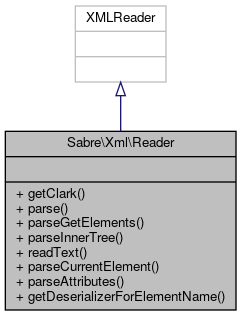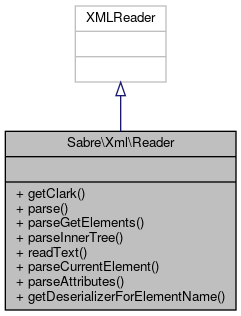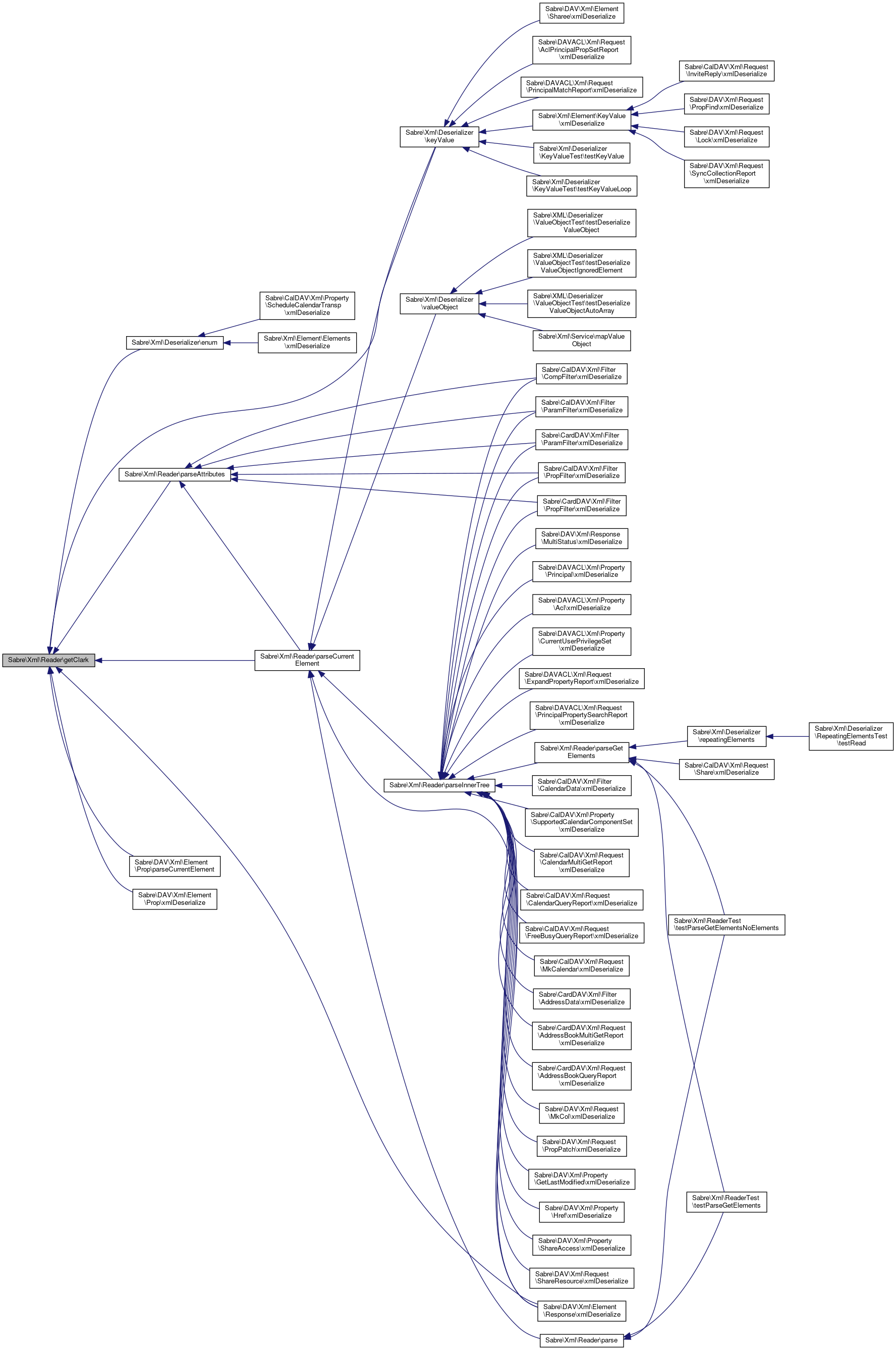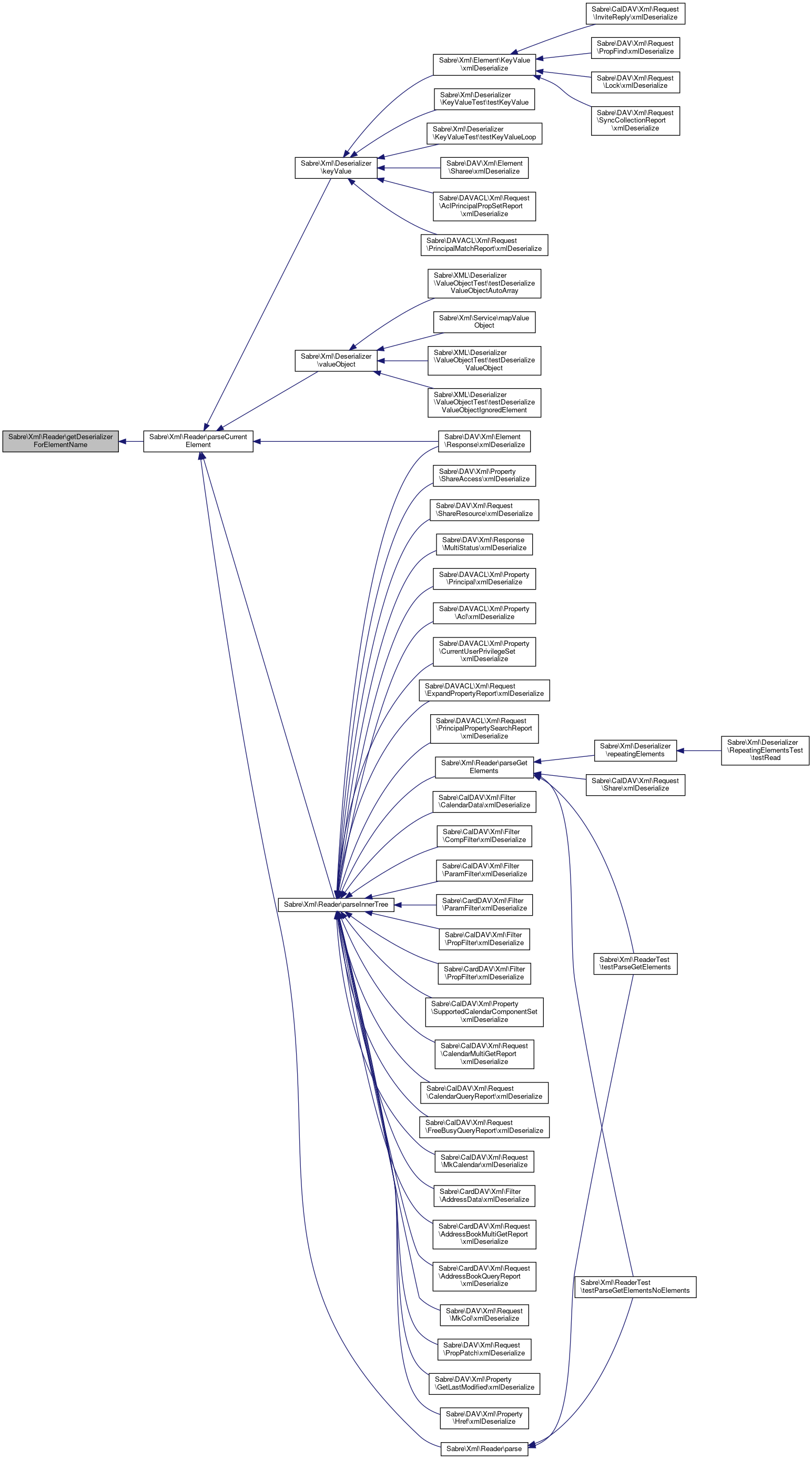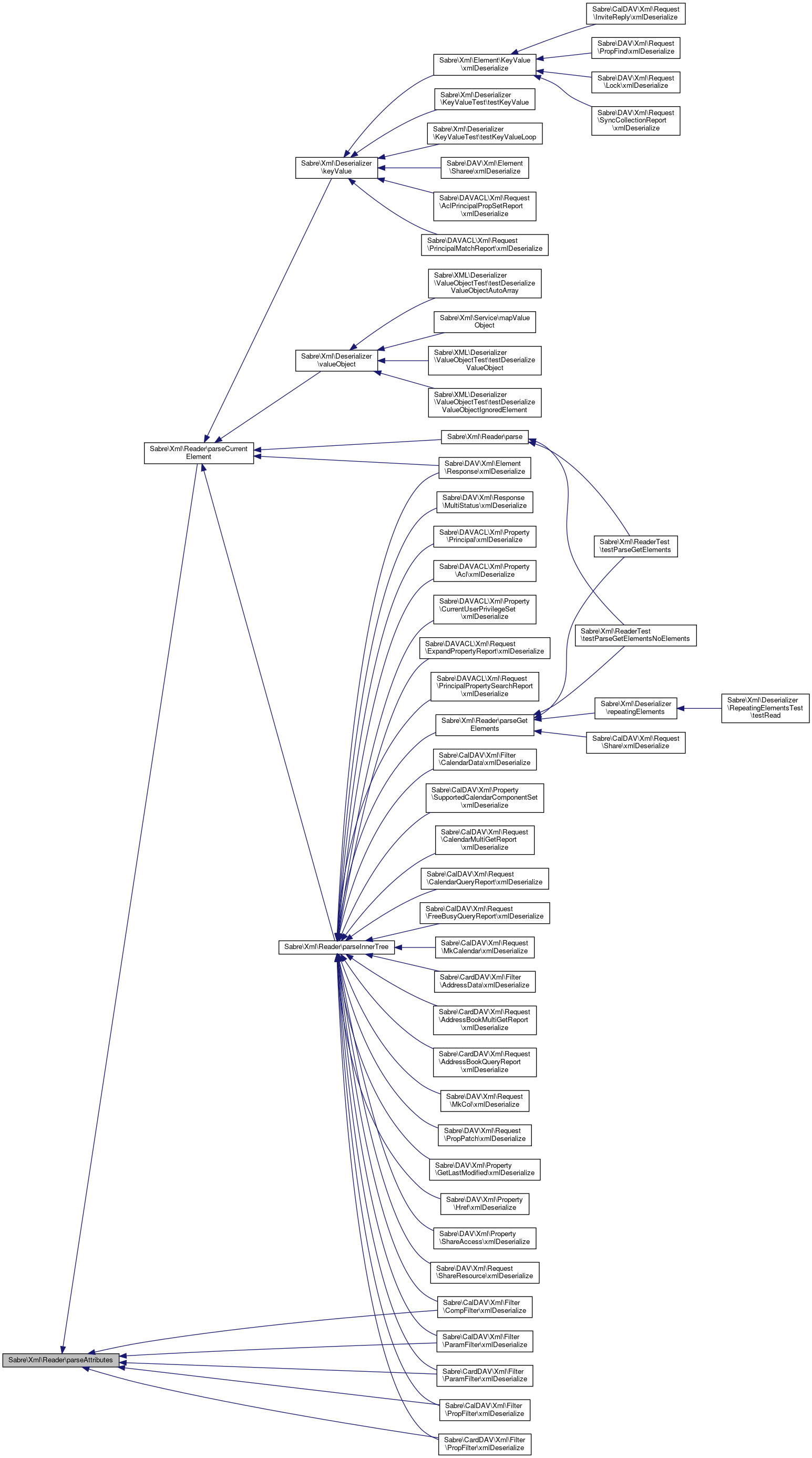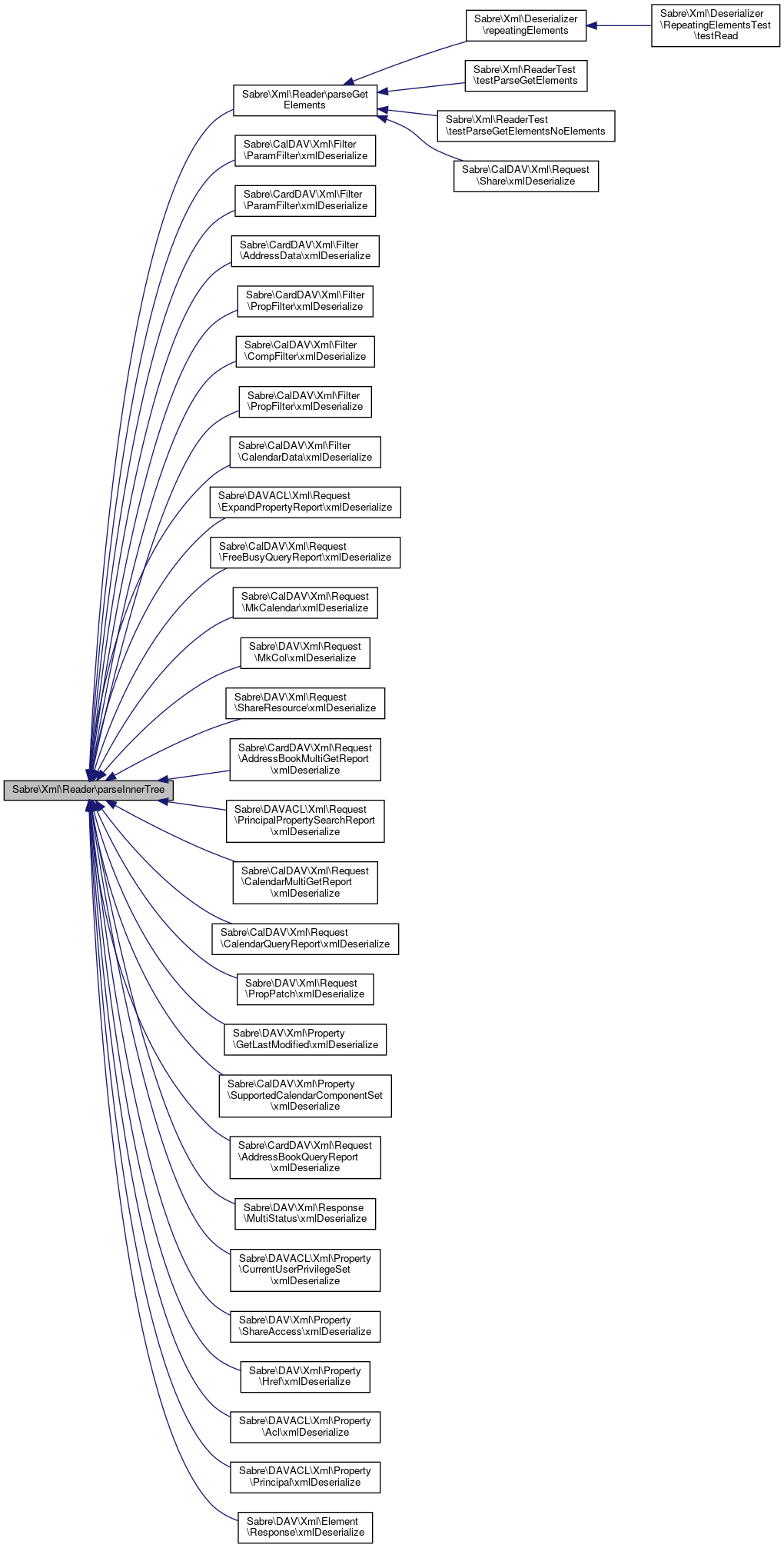The Reader class expands upon PHP's built-in XMLReader. More...
 Inheritance diagram for Sabre\Xml\Reader:
Inheritance diagram for Sabre\Xml\Reader: Collaboration diagram for Sabre\Xml\Reader:
Collaboration diagram for Sabre\Xml\Reader:Public Member Functions | |
| getClark () | |
| Returns the current nodename in clark-notation. More... | |
| parse () | |
| Reads the entire document. More... | |
| parseGetElements (array $elementMap=null) | |
| parseGetElements parses everything in the current sub-tree, and returns a an array of elements. More... | |
| parseInnerTree (array $elementMap=null) | |
| Parses all elements below the current element. More... | |
| readText () | |
| Reads all text below the current element, and returns this as a string. More... | |
| parseCurrentElement () | |
| Parses the current XML element. More... | |
| parseAttributes () | |
| Grabs all the attributes from the current element, and returns them as a key-value array. More... | |
| getDeserializerForElementName ($name) | |
| Returns the function that should be used to parse the element identified by it's clark-notation name. More... | |
Detailed Description
The Reader class expands upon PHP's built-in XMLReader.
The intended usage, is to assign certain XML elements to PHP classes. These need to be registered using the $elementMap public property.
After this is done, a single call to parse() will parse the entire document, and delegate sub-sections of the document to element classes.
- Copyright
- Copyright (C) 2009-2015 fruux GmbH (https://fruux.com/).
Definition at line 20 of file Reader.php.
Member Function Documentation
◆ getClark()
| Sabre\Xml\Reader::getClark | ( | ) |
Returns the current nodename in clark-notation.
For example: "{http://www.w3.org/2005/Atom}feed". Or if no namespace is defined: "{}feed".
This method returns null if we're not currently on an element.
- Returns
- string|null
Definition at line 34 of file Reader.php.
Referenced by Sabre\Xml\Reader\parseAttributes(), and Sabre\Xml\Reader\parseCurrentElement().
 Here is the caller graph for this function:
Here is the caller graph for this function:◆ getDeserializerForElementName()
| Sabre\Xml\Reader::getDeserializerForElementName | ( | $name | ) |
Returns the function that should be used to parse the element identified by it's clark-notation name.
- Parameters
-
string $name
- Returns
- callable
Definition at line 300 of file Reader.php.
Referenced by Sabre\Xml\Reader\parseCurrentElement().
 Here is the caller graph for this function:
Here is the caller graph for this function:◆ parse()
| Sabre\Xml\Reader::parse | ( | ) |
Reads the entire document.
This function returns an array with the following three elements:
- name - The root element name.
- value - The value for the root element.
- attributes - An array of attributes.
This function will also disable the standard libxml error handler (which usually just results in PHP errors), and throw exceptions instead.
- Returns
- array
Definition at line 57 of file Reader.php.
References $errors, $result, and Sabre\Xml\Reader\parseCurrentElement().
 Here is the call graph for this function:
Here is the call graph for this function:◆ parseAttributes()
| Sabre\Xml\Reader::parseAttributes | ( | ) |
Grabs all the attributes from the current element, and returns them as a key-value array.
If the attributes are part of the same namespace, they will simply be short keys. If they are defined on a different namespace, the attribute name will be retured in clark-notation.
- Returns
- array
Definition at line 268 of file Reader.php.
References $attributes, $name, and Sabre\Xml\Reader\getClark().
Referenced by Sabre\Xml\Reader\parseCurrentElement().
 Here is the call graph for this function:
Here is the call graph for this function: Here is the caller graph for this function:
Here is the caller graph for this function:◆ parseCurrentElement()
| Sabre\Xml\Reader::parseCurrentElement | ( | ) |
Parses the current XML element.
This method returns arn array with 3 properties:
- name - A clark-notation XML element name.
- value - The parsed value.
- attributes - A key-value list of attributes.
- Returns
- array
Definition at line 235 of file Reader.php.
References $attributes, $name, Sabre\Xml\Reader\getClark(), Sabre\Xml\Reader\getDeserializerForElementName(), and Sabre\Xml\Reader\parseAttributes().
Referenced by Sabre\Xml\Reader\parse(), and Sabre\Xml\Reader\parseInnerTree().
 Here is the call graph for this function:
Here is the call graph for this function: Here is the caller graph for this function:
Here is the caller graph for this function:◆ parseGetElements()
| Sabre\Xml\Reader::parseGetElements | ( | array | $elementMap = null | ) |
parseGetElements parses everything in the current sub-tree, and returns a an array of elements.
Each element has a 'name', 'value' and 'attributes' key.
If the the element didn't contain sub-elements, an empty array is always returned. If there was any text inside the element, it will be discarded.
If the $elementMap argument is specified, the existing elementMap will be overridden while parsing the tree, and restored after this process.
- Parameters
-
array $elementMap
- Returns
- array
Definition at line 105 of file Reader.php.
References $result, and Sabre\Xml\Reader\parseInnerTree().
 Here is the call graph for this function:
Here is the call graph for this function:◆ parseInnerTree()
| Sabre\Xml\Reader::parseInnerTree | ( | array | $elementMap = null | ) |
Parses all elements below the current element.
This method will return a string if this was a text-node, or an array if there were sub-elements.
If there's both text and sub-elements, the text will be discarded.
If the $elementMap argument is specified, the existing elementMap will be overridden while parsing the tree, and restored after this process.
- Parameters
-
array $elementMap
- Returns
- array|string
Definition at line 129 of file Reader.php.
References $errors, $text, Sabre\Xml\Reader\parseCurrentElement(), Sabre\Xml\popContext(), and Sabre\Xml\pushContext().
Referenced by Sabre\Xml\Reader\parseGetElements().
 Here is the call graph for this function:
Here is the call graph for this function: Here is the caller graph for this function:
Here is the caller graph for this function:◆ readText()
| Sabre\Xml\Reader::readText | ( | ) |
Reads all text below the current element, and returns this as a string.
- Returns
- string
Definition at line 211 of file Reader.php.
References $result.
The documentation for this class was generated from the following file:
- libs/composer/vendor/sabre/xml/lib/Reader.php
